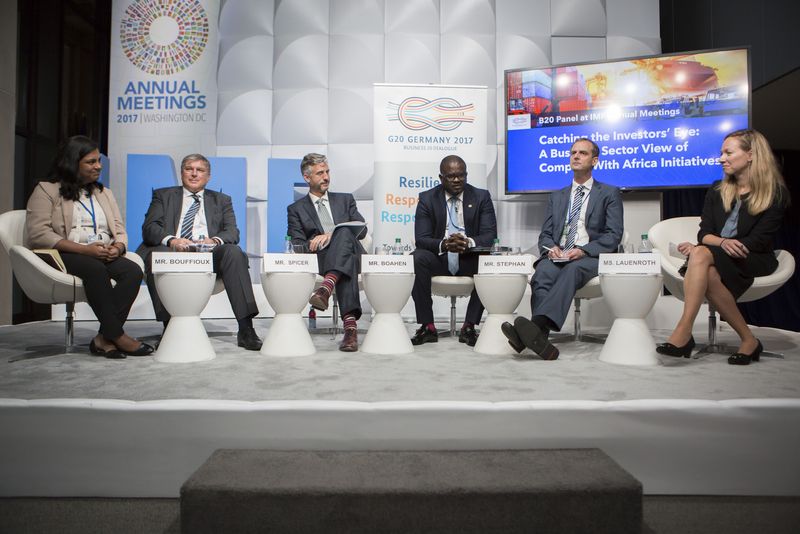Sustainable Private Investments Vital for Sustainable Growth
International investors have shown a great degree of interest in the CWA. However, sustainable foreign and domestic investment will only increase in Compact countries if the right conditions are put in place and political risks are contained, B20 underlined during the panel “Catching the Investor’s Eye – A Business Sector View of the CWA” at the IMF annual meeting, October 12, 2017.
B20 participants André Bouffioux, Lead Country CEO, Maghreb and Sub-Saharan Africa at Siemens, and Shalini Unnikrishnan, Partner and Managing Director at the Boston Consulting Group, emphasized their interest in supporting the CWA. "We strongly support the CWA. It is a driver for ethical business," Bouffioux underlined. However, Compacts need to tackle several challenges. Among these are political instability and uncertainty, unreliable energy systems, and inefficiencies in trade logistics. Similarly, security is still a problem in many Compact countries. “A great real value of the CWA also lies in its impact on regional cooperation. The CWA will strengthen the cooperation between African countries, but also the competition,” emphasized Unnikrishnan. This will create a win-win situation for the Compact countries but also for the businesses operating in them. Jörg Stephan, Deputy Director General, G20 Policy, German Federal Ministry of Finance, as well as Charles Adu Boahen, Deputy Minister of Finance of Ghana, and Martin Spicer, Director of Blended Finance at the International Finance Corporation (IFC), gave an overview of the current state of play in implementing the CWA initiative, calling upon the business community to play its part.
The CWA initiative provides a framework for boosting private investment and advancing infrastructure in Africa. It aims to improve the macroeconomic, political, and financial environment for private investment. The G20 and international organizations support the Compact countries in developing a nationally-owned reform agenda. The CWA is demand-driven and open to all African countries. Benin, Cote d’Ivoire, Egypt, Ethiopia, Ghana, Guinea, Morocco, Rwanda, Senegal, and Tunisia have already joined the initiative.
CWA – the G20 Germany Legacy
B20 Germany also participated in the high-level IIF Compact with Africa Event, which took place October 11, 2017. “Whether the CWA will be a success or failure depends on the implementation of the CWA,” stated Ludger Schuknecht, Chief Economist at the German Finance Ministry and German Finance Deputy of the G20 Germany Presidency. With the upcoming handover of the G20 Presidency, it is up to G20 Argentina to make progress in implementing the CWA. Nevertheless, Schuknecht reaffirmed the continued support of G20 Germany for the CWA. “African ownership and not Western prescription” will be the motto for implementing the Compact with Africa.
From the African Compact countries, Mohamed Boussaid, Minister of Economy and Finance of Morocco, Ken Ofori-Atta, Minister of Finance of the Republic of Ghana, Claver Gatete, Minister of Finance and Economic Planning of Rwanda, and Adama Koné, Minister of Economy and Finance of Côte d’Ivoire, participated in this high-level CWA meeting.

